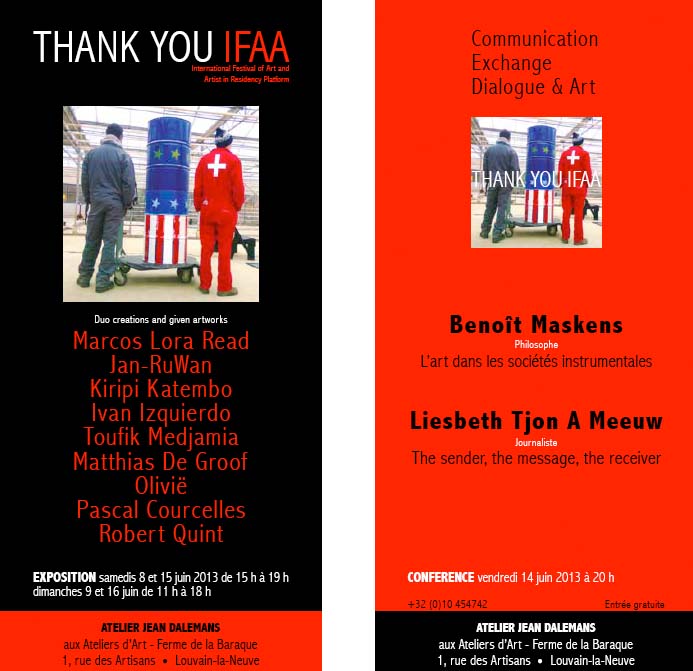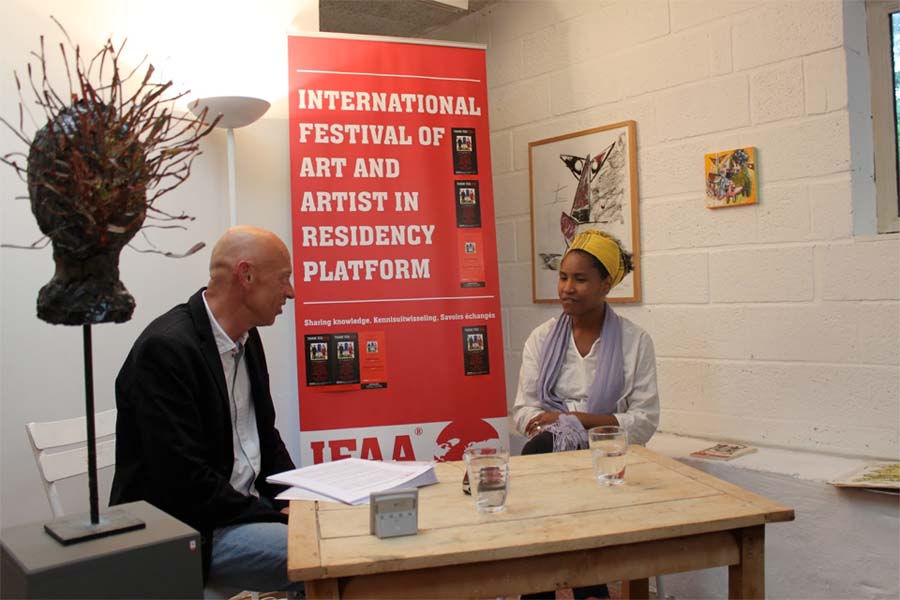The Sender, the Message, the Vehicle and the Receiver
A reflection on IFAA 2012
As a journalist I'm considered to be a communication expert. However, we're all skilled in having dialogues with one another, whether we use words, images or physical language. Moreover, we're also very much aware of the errors in our communication. We can all point out the moments when we were misunderstood, ignored or even lied to. During IFAA 2012, I was invited to engage with the residency artists on the theme: Communication, Exchange, Dialogue and Art with the purpose of reflecting on today’s society.
I share the IFAA concerns about a lack of care for one another, the detachment of self and how all of that effects the development of our societies. The artists’ works reflected the communication processes in our society and the human commonality in response to this theme. In this critical writing, I join their discussion by focusing on the content of our daily communication. I bring in an expert’s view within the media field, and plead to take control over our own flow of information...

In this discussion we share the same common goal: to come up with an answer to the question of how we communicate with each other nowadays. In my analysis, I simply look at the elements of sender, message, vehicle, and receiver. Every element has its own values and structures. Between the sender and receiver there is a vivid exchange of emotions, feelings, thoughts, perceptions and ideas. That process could be either strong and dynamic or very weak and briefly. We constantly send and receive messages. Most of the time we are not even aware of the fact that this exchange is taken place, let alone of its content.
In today's world, it has become more than ever before important, to make a personal selection about what kind of message we wish to receive or send out. The information that we collect and use, comes from a variety of sources and devices. It influences the way we view ourselves and the world around us. We form our opinions and act upon those assumptions. In other words, we create our own culture, based on those notions. Our advanced technology, has made the flow of information much more dynamic. We could call it an explosion of information, which covers us day by day. At the same time, it also shows how limited we are in the amount of information we are able to receive, filter and digest.
When I say 'limited', I do not only mean the internet-user on the world wide web. I'm also talking about the limitations of governments, institutes, enterprises and press agencies. Behind the big walls of those organizations it is still a human hand -and mind- that collects the data, makes the interpretation and shares a certain message with the public. Do those communicators really control the vivid flow of information going around the globe every day? Are they not being surpassed by other groups of transmitters? Let's take for example a field that I know very well: the media industry, an important communicator in our society, so to speak.

Media organizations are trained to select loads of information and mold it into facts and figures that we can easily take in as news-consumers. Press agencies are paid to do so, but their job is becoming less and less efficient. Not only are they missing important information and angles that find its receivers through other lines, they are also losing touch with reality. Most people in the media industry work behind a computer and hardly explore the field beyond the four walls of their office building. Their view on what's happening on the ground, is very limited. They keep exploring the same sources about the same issues in the same way. Unfortunately, due to financial cutbacks and further commercialization, that style of working has become a standard in journalism. Can you imagine what happens to the contents of that kind of report? Just to think that our society is largely based on this information flow.
We can't leave our communication lines in the hands of others, we must take control of it ourselves. That means we have to make our own selections and seek our own sources that can bring us further in our cultural development. Information is like food. Some messages are good for our mental and spiritual health. Other messages jeopardize our health, bring it out of balance and harm our optimistic way of thinking. This results in the blockage our development process. The rapid flow of information is like a river that is growing during the rainy season. We have no choice but to build a boat in order not to drown.
The question is now, how do we become responsible communicators? We could start by becoming aware of our senses. Our senses play an important role in receiving, filtering or sending information. Every message has its own taste. It resonates in our body, makes us feel a certain way. We worry when we hear bad news and are happy when we hear about prosperity. The essential point of today's communication is to recognize the message that can help us further. A message that can strengthen our personal development, and at the same time encourage us to take action. We are all responsible to do so. It's our common goal.
As a journalist I plead for news coverage that serves that common goal. It's not a matter of replacing bad news with good news. It's a matter of being conscious of the constructive message we send out into the world. To me, that implies, making stories that really add something to the public perception, and shed a bright light into the future. Spreading knowledge that can help us to build up and improve our society. During this IFAA project I became aware of my responsibility as a professional communicator. For far too long, journalists have merely stood at the sidelines, commenting on issues. I believe, that if you want to report about problematic issues, you should also have the intention to actively partake in the discussion about finding solutions.
It takes courage to enter public spaces with not only an open mind, but also with open senses and an open heart. As this openness can lead to new discoveries, to a whole new world, that can be found through the perspective of another person. When we make connections like these, we create a vivid flow of ideas, perceptions, thoughts, feelings and emotions. I see it as the final step towards actually experiencing our common ground, and therefore our common goal.
See also the my audiovisual portraits for IFAA 2012 in Belgium